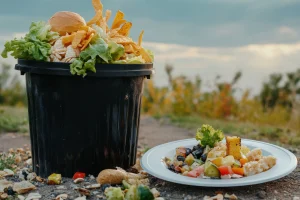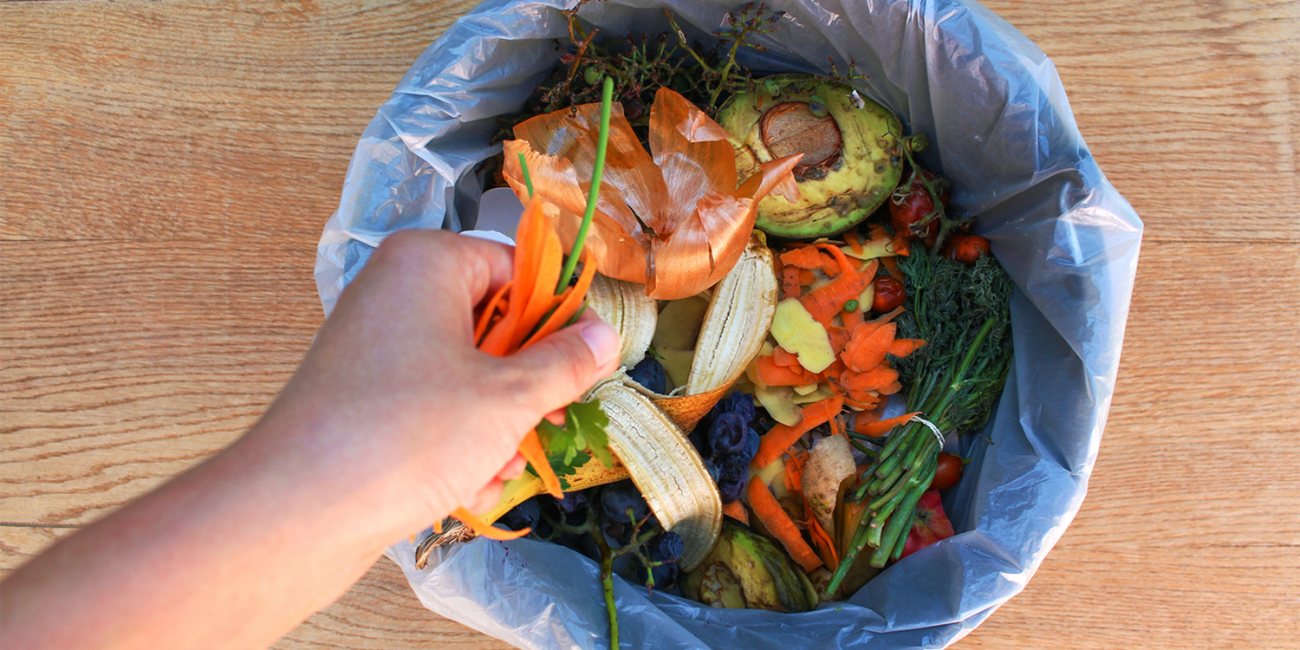Food waste is a troubling global phenomenon with profound economic, social, and environmental implications. While millions of people around the world suffer from hunger and malnutrition.
massive amounts of food fit for human consumption are wasted at every stage of the supply chain, from farm to fork. According to the Food and Agriculture Organization of the United Nations (FAO), approximately 1.3 billion tons of food are wasted globally each year enough to feed more than 1.6 billion people.
How the Problem Is Evolving:
Food waste has evolved over the decades, from being primarily an issue related to hunger and malnutrition to a multifaceted issue encompassing environmental, economic, and social impacts. The following is a summary of the evolution of this problem from 1974 to the projections for 2030:
In 1974, global food waste was estimated at 400 million tons annually.

Sustainable Development Goals (SDGs): In 2015, Target 12.3 of the Sustainable Development Goals included “halving per capita global food waste at the retail and consumer levels by 2030, and reducing food losses along production and supply chains.”

Food Waste Index Reports: The United Nations Environment Programme has published detailed reports, such as the 2021 and 2024 reports, that more accurately estimate the extent of global food waste. The 2024 report indicates that the world wasted approximately 19% of the food produced globally in 2022, or approximately 1.05 billion metric tons, with 60% of waste occurring at the household level.
Food Waste Outlook for 2030 and Beyond:
Target 12.3 Challenge: Despite efforts, progress remains slow, and there is an urgent need to accelerate the pace to achieve the goal of halving food waste by 2030.
Potential Increase: Some projections indicate that without effective interventions, food loss and waste could double by 2050.
Continued Pressure: The food waste problem will remain under pressure due to population growth, food security challenges, climate change, and the need to use resources more efficiently.
Integrated solutions: Solving the problem will require integrated efforts from all stakeholders: governments, producers, retailers, consumers, and the private sector, with a focus on innovation in supply chains, improving awareness, and changing consumer behaviors.
Food waste has evolved from being a facet of the hunger problem in the 1970s to a complex and globally impactful issue with significant environmental, economic, and social dimensions. As 2030 approaches, achieving the Sustainable Development Goals related to reducing food waste remains a major challenge that requires concerted global efforts.
The Food Waste Problem in the Middle East and UAE
Food waste is a major challenge in the Middle East in general, and in the UAE in particular, with dire environmental, economic, and social consequences. The scale of the problem in the Middle East and the UAE:

- Middle East and North Africa: It is estimated that approximately one-third of the food produced in this region is lost or wasted.
- Saudi Arabia: It has one of the highest rates of food waste in the world, with the average Saudi citizen wasting approximately 427 kilograms of food annually, with the estimated value of this waste being approximately $10.6 billion annually.
- United Arab Emirates: Approximately 3 million tons of food are wasted annually, with the economic cost reaching approximately $3.5 billion annually. In Dubai alone, 38% of prepared food is wasted, and this percentage increases to 60% during Ramadan. Food alone accounts for approximately 40% of the average household’s waste.
The National Food Security Strategy 2051 is the comprehensive framework guiding the UAE’s efforts in this regard. This strategy aims to make the UAE among the best in the world on the Global Food Security Index by 2051. Key targets related to food waste include:
UAE’s Commitment Under Net Zero 2050
- Reducing food waste by 50% by 2030: This is the most urgent goal to which the UAE is committed, in line with Target 12.3 of the UN Sustainable Development Goals.
- Ensuring food security in all circumstances by 2051: By enabling technology-based sustainable food production, fostering international trade partnerships, and implementing policies and regulations that reduce food loss and waste.
- Achieving a “Nation Without Food Waste”: This is the overarching vision of the “Naama” National Food Loss and Waste Reduction Initiative, which seeks to establish a new culture that promotes sustainability across the food supply chain.
Dubai and Abu Dhabi Municipalities'
policies to encourage food waste
In support of these initiatives, Dubai and Abu Dhabi municipalities have implemented policies encouraging:

Mandatory food waste segregation for large food producers.
The development of organic waste recycling plants, such as Dubai’s Warsan facility, which converts organic waste into fertilizer and energy.
Partnerships with the private sector to develop technology-driven food waste solutions like AI-based food monitoring systems in hotels and restaurants.

Reducing food waste plays a direct role in the UAE’s ambition to lower greenhouse gas emissions by 25% by 2030 and reach net zero emissions by 2050. Addressing the global food waste problem in the UAE is no longer optional—it’s essential for environmental sustainability, economic resilience, and food security.
UAE’s Commitment Under Net Zero 2050
The National Food Security Strategy 2051 is the comprehensive framework guiding the UAE’s efforts in this regard. This
strategy aims to make the UAE among the best in the world on the Global Food Security Index by 2051. Key targets related
to food waste include:
The “Naama” National Initiative: This is a pioneering national initiative aimed at bringing about behavioral change in how people deal with food waste. Naama works to build capacity to monitor food loss and waste, strengthen public-private partnerships, implement innovative circular economy approaches, and introduce new policies and legislation.
Food Loss and Waste Baseline Surveys: The UAE is conducting comprehensive studies to determine levels of food loss and waste across various sectors (homes, farms, and food businesses) and establish a baseline for this data, which helps develop evidence-based strategies.
Circular Economy Policy 2021-2031: This policy aims to transition from a linear to a circular economy, including reducing, reusing, and recycling resources across all sectors, including the food sector.
Awareness Initiatives and Community Campaigns: Ongoing awareness campaigns are launched to encourage individuals and organizations to adopt sustainable practices and reduce waste, especially during occasions such as Ramadan. Supporting food banks and charities: There are numerous initiatives, such as the UAE Food Bank and the Emirates Red Crescent’s “Preserving Grace” project, which collect surplus food and distribute it to needy families.
Adopting modern technologies: The UAE encourages the use of modern technology in food production and management to increase efficiency and reduce waste.
Improving policies and legislation: Working to develop and implement legislation and policies that contribute to improving nutrition and reducing waste.
Problems Caused by Food Waste
Food waste creates multiple and complex problems that impact the environment, economy, and society. Here are the most prominent of these problems:

Environmental Problems
Climate Change and Greenhouse Gas Emissions: Wasted food is one of the largest sources of greenhouse gas emissions, particularly methane, which is produced when food decomposes in landfills. Methane is much more potent than carbon dioxide at trapping heat, contributing significantly to global warming and climate change. If food waste were a “country,” it would be the third-largest source of greenhouse gas emissions after China and the United States.
Depletion of Natural Resources: Food production requires vast amounts of resources such as water, agricultural land, and energy. For example, it takes 100 buckets of water to produce one loaf of bread. When food is wasted, we waste these precious resources that were used to produce it.
Soil Degradation and Biodiversity Loss: The expansion of agricultural land to meet growing food demand is leading to deforestation, soil degradation, and the loss of natural habitats, threatening biodiversity. When food is wasted, this environmental damage is in vain.
Pollution: Improper disposal of wasted food can contaminate soil and groundwater with chemicals and pesticides used in agriculture.
Economic Problems
Huge Financial Losses: Food waste costs the global economy trillions of dollars annually. These losses extend not only to consumers who buy food they don’t eat, but also to farmers, producers, suppliers, and retailers throughout the food supply chain.
Increased Waste Treatment Costs: Disposing of wasted food in landfills requires additional resources and costs for governments and local communities.
Wasted Investments: All the money, effort, and time invested in growing, harvesting, processing, transporting, and storing food is wasted when the food is not consumed.
Social Problems
Increasing Hunger and Food Insecurity: While the world wastes massive amounts of food, millions of people around the world suffer from hunger and malnutrition. The wasted food could feed approximately two billion people.
Food maldistribution: Food waste highlights a larger problem related to the maldistribution of food globally, with abundance concentrated in some regions while shortages persist in others.
Ethical responsibility: Food waste raises ethical questions about resource consumption and human needs, especially when there are those in desperate need.
Reducing food waste plays a direct role in the UAE’s ambition to lower greenhouse gas emissions by 25% by 2030 and reach net zero emissions by 2050. Addressing the global food waste problem in the UAE is no longer optional – it’s essential for environmental sustainability, economic resilience, and food security.
Renuterra’s Role in Reducing Food Waste
Renuterra has strong advantages in reducing food waste through its innovative solutions that focus on transforming waste into valuable resources. Here are the most prominent advantages:

1. Converting waste into energy and valuable resources
- Producing renewable energy (biogas): Renuterra uses anaerobic digestion technology to convert thousands of tons of food waste into biogas, a renewable energy source that can be used to generate electricity and heat. This reduces dependence on fossil fuels and contributes to a cleaner energy future.
- Producing organic fertilizer: The anaerobic digestion process produces a nutrient-rich “digestible” that can be used as organic fertilizer to promote sustainable agriculture, closing the resource recovery loop.
- Transforming organic waste into valuable products: Renuterra goes beyond simply disposing of waste, transforming it into valuable by-products, such as organic fertilizer and possibly even fruit and vegetable powders that can be used in nutritional supplements or food ingredients.
2. Reducing carbon emissions and minimizing environmental impact
- Mitigating greenhouse gas emissions: Diverting food waste through anaerobic digestion significantly reduces methane emissions, a potent greenhouse gas produced by food decomposition in landfills. Renuterra contributes to combating climate change and preventing the release of approximately 2.5 kg of carbon dioxide emissions for every kg of food waste diverted.
- Diverting waste from landfills: By recycling food waste, Renuterra reduces the amount of organic material reaching landfills, reducing the burden on landfills and conserving space.
- Conserving natural resources: Renuterra’s solutions reduce the need to deplete natural resources associated with traditional energy production and waste disposal.
3. Comprehensive food waste management solutions
- Specialized food waste collection services: Renuterra provides specialized containers and a fleet of trucks dedicated to collecting food waste from various locations (such as restaurants, hotels, and residential areas), ensuring efficient separation and collection.
- Accurate reporting and assistance in achieving sustainability goals: The company works closely with clients to increase waste diversion rates and provide accurate reporting, helping companies meet their sustainability goals.
- Waste to Value: Renuterra adopts an approach that aims to transform waste into valuable resources, supporting the circular economy and promoting sustainability.
4. Supporting Sustainable Agriculture
- Nutrient-Rich Compost: Converting food waste into compost enriches the soil with essential nutrients, promoting sustainable agriculture and reducing the need for chemical fertilizers.
- It’s worth noting that Renuterra offers comprehensive and sustainable food waste management solutions that not only reduce waste but also transform it into an opportunity to produce renewable energy and recover valuable resources, benefiting both the environment and the economy.
- Renuterra offers comprehensive and innovative waste management solutions, particularly for food waste, effectively integrating with the UAE’s strategy to eliminate food waste by 2050 (which actually targets a 50% reduction by 2030 as an intermediate goal within the framework of “Naama” and the broader Vision 2050).

Renuterra offers innovative technological solutions to transform food waste from an environmental problem into an economic resource, effectively supporting the UAE’s ambitious goals for food security, environmental sustainability, and food waste reduction by 2050.

